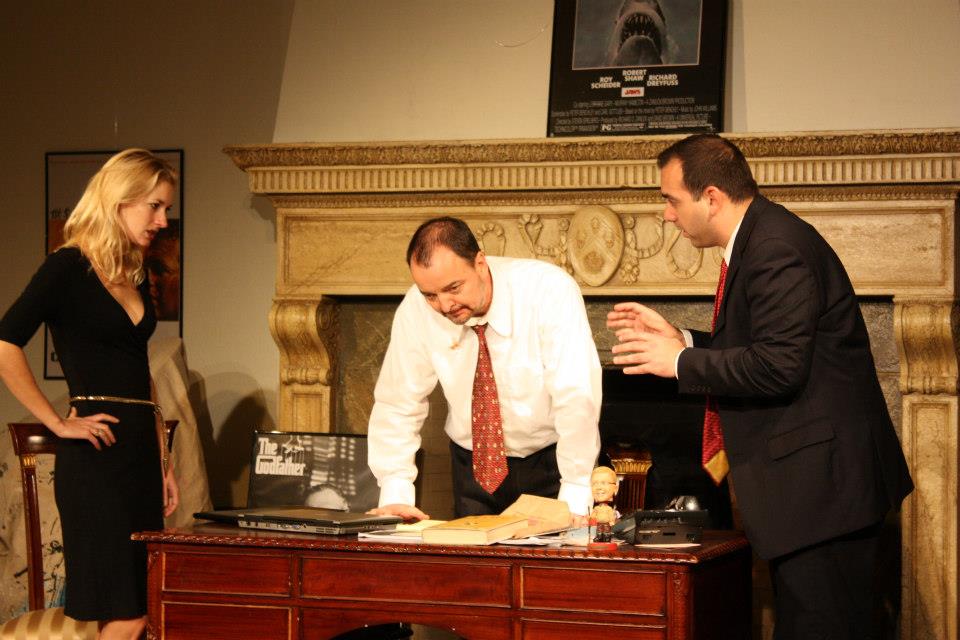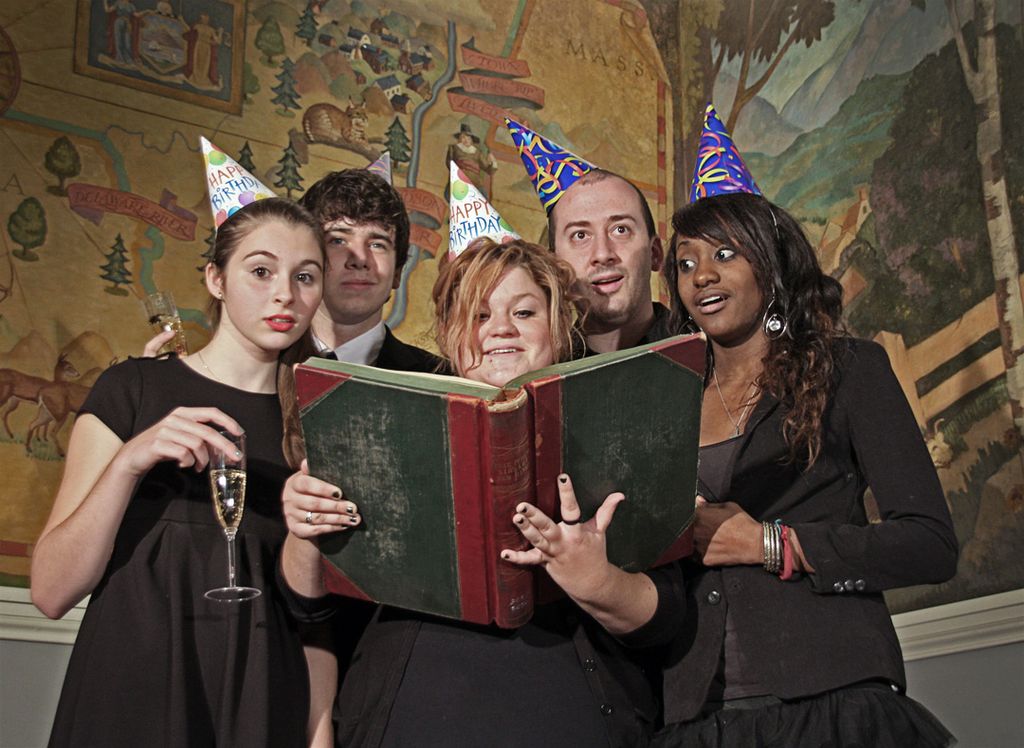The Yale Cabaret is unexpectedly dark this weekend, so what’s a fan of New Haven theater to do? Answer: go see The New Haven Theater Company’s production of David Mamet’s Speed-the-Plow, delivered in quick and dirty fashion by director George Kulp at UpCrown Creative Studios on Crown Street. The play builds upon triads to create a dilemma: three characters, three scenes, and a choice: which of two films to “green light.” For recently promoted movie producer Bobby Gould (J. Kevin Smith, anxiously expansive), it’s not simply a choice about which film would do better or make more money, it’s also a choice about loyalties, about love and lust, about—yes, even in Hollywood—responsibility. The situation also carries implications of sexual politics and office politics. With the Petraeus scandal currently running amok in the press, the NHTC has yet again pulled out of its hat a play that speaks to its moment.
Of the two films, one is a sure-fire blockbuster—a buddy prison picture that would be a vehicle for Doug Brown, a big-name star—while the other is a do-gooder: a film about “the end of the world” through a nuclear disaster (think: The Morning After). The first film is pitched by Charlie Fox (Steve Scarpa, aggressive and fast-talking). Sweaty and dying for a coffee, Charlie is a friend and colleague of Bobby’s from way back, who now is poised to deliver the coup that will make them both rich men and set them on to bigger and better things. The Brown film is the proverbial pot of gold the rainbow’s end always promised.
When Charlie enters, Bobby is giving a “courtesy read” to the nuclear disaster novel and scorning it. The idea of making it into a film is poised to be a joke until. . . . Male sexual one-upmanship rears it head when the two men bet on Bobby’s ability to seduce his pretty, temporary secretary, Karen (Megan Keith Chenot, lithe and blithe), who seems to know nothing about the film business and not much about being a secretary. Seemingly guileless, in other words. And, in Charlie’s view, not slutty enough to sleep with Bobby “just because,” and also not ambitious enough to sleep with him just to get ahead. So, the wager: if Bobby can get her into bed, it will have to be on the basis of his own charms.
The play’s middle scene, then, is the seduction scene at Bobby’s place, and the final scene is the fall-out, so to speak, on the morning after (10 a.m., time for the do-or-die meeting with Ross, the man upstairs whose OK is needed for the Doug Brown project). Bobby is only going to pitch one film and his new “change of heart” (if we can call it that) is leaning toward the disaster picture. What about friendship?
The strength of this production is that it moves at a fast and furious pace—Scarp and Smith are gangbusters at delivering the rapid-fire speech Mamet is famous for, talking over each other, responding to cues before the other has finished speaking. The technique creates a believable social friction between two colleagues, also friends, who know each other’s moves and are happy to be on the same page. Things slow down a bit with Karen, who at first, seen through the men’s eyes, seems like the kind of prize that goes with being newly made kings. Chenot plays Karen with detached intelligence: she doesn’t fawn over the men nor try to entice, but in the scene at Bobby’s place, all comfy on the couch, we see that her matter-of-factness about the quid pro quo seduction surprises Bobby, who still thinks you have to use subterfuge in these matters.
It’s the sort of thing you don’t expect to find in Mamet: the scene is almost sweet and is gently comical. It also shows how easily the manipulator becomes the manipulated. Karen, you see, believes passionately in the nuclear disaster picture, called The Bridge. And that passion, now shared suddenly by Bobby, becomes the bridge between them. This part of the play would benefit from Smith switching gears a little more to convince us Bobby is convinced.
The play’s outcome can be read various ways, and one of the demands of Speed-the-Plow is that the production has to decide which way it’s going to go. Are we meant to side with Charlie or with Karen? Which film is in the “best interests” of Bobby, and what exactly are those interests and when should personal interest in a project be set aside for some other criteria, more neutral or more noble, as the case may be?
Is The Bridge part of a temptation best set aside, or is it the path to salvation?
Kulp's direction goes for the pragmatism of the play, which makes sense since it's hard to see a moral high-ground in Mamet's vision. The final scene climaxes with gripping precision: Scarpa explodes without making a mess and Smith manages to salvage Bobby’s dignity even as we see that he has ceased being his own man.
This is entertaining Mamet, and the NHTC keeps its eye on the ball throughout, delivering a speedy Speed-the-Plow. It goes by fast, and you might have to lean forward a little to catch it all.
The play shows for two more nights, three performances: Friday, 7 p.m.; Saturday, 4 & 7 p.m.
Speed-the-Plow By David Mamet Directed by George Kulp Produced by Drew Gray
Stage Manager: Erich Greene; Lighting Technician: Tom DeChello
New Haven Theater Company at UpCrown Creative Studios 216 Crown Street, New Haven
November 14, 16, 17, 2012








